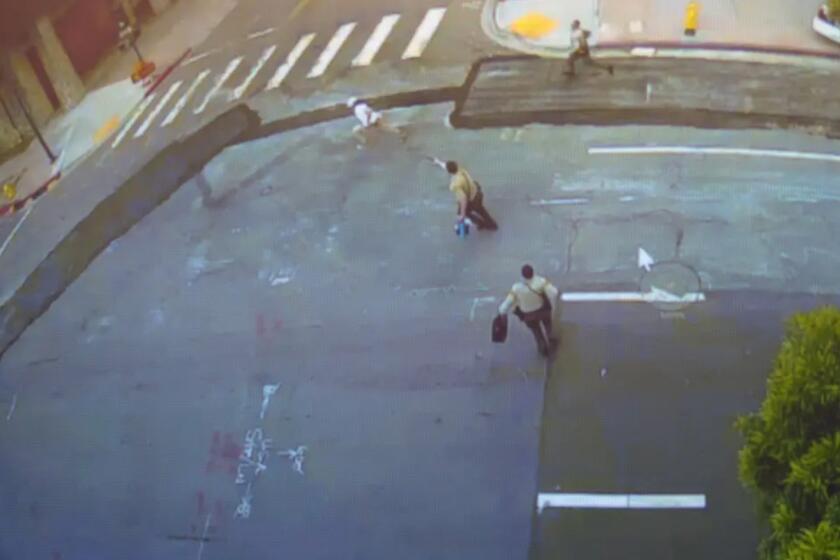Judge Orders Release of Data for Jail Probe : Investigation: U.S. court says the county must turn over information, including reports on deputies, to the Justice Department, which is probing possible abuse at jails.
A federal judge Monday ordered San Diego County to turn over inmate medical records, death reports, deputies’ discipline files and other materials sought by the U.S. Justice Department for its investigation into possible abuse at the county’s six jails.
Ruling that the federal government “needs access to the facts,” U.S. District Judge John S. Rhoades opened the records after U.S. attorneys sought an injunction against the county demanding the documents.
For months, the probe into possible civil rights violations at the jails has pitted federal attorneys from Washington against the county counsel’s office, which has argued that state confidentiality laws protect the privacy of deputies and inmates.
Last month, the U.S. government said the county had obstructed its investigation during its visit in February to tour the downtown, South Bay and Vista jails.
The probe, which included a team of medical and correctional experts, was a continuation of a 1989 examination into jail conditions, officials said. Federal investigators have not said whether they have enough evidence based on February’s visit to file a civil rights lawsuit against the county.
County attorneys rebutted the federal government’s contention that the county had refused to hand over documents, saying they had prepared and gathered “hundreds of pages of documents for the (federal government) team when it arrived, yet the team showed scant interest.”
They complained that federal investigators gave them only 11 days to produce the information and yet county officials still were able to turn over inmate death records, autopsy reports, policies that govern the use of force by correctional deputies, employee rosters, a Sheriff’s Department organizational chart, a list of inmates who received medical treatment and other information.
Between the time the Justice Department filed its complaint last month and Monday’s hearing, Deputy County Counsel Ian Fan said, the county had already agreed to turn over all medical records and “inmate status reports,” which document any time force is used against a prisoner.
“Like a bull in a china shop, the Department of Justice has bulled its way into court seeking injunctive relief against the county,” Fan said in his motion opposing the injunction.
“Citing a parade of horrors, which are unsupported by any evidence whatsoever, DOJ avers that the county has unreasonably impeded the investigation. . . . There is no authority to support DOJ’s contention that it be permitted unrestricted access,” he said.
Citing a 1983 federal decision involving the state of Hawaii, Fan said the county is not legally required to provide the information but did so anyway.
Throughout the legal maneuverings, Fan has argued that state confidentiality laws “preempt” the rights of the federal government to obtain certain documents, including discipline reports against deputies and the medical records of inmates.
Both Judge Rhoades and U.S. attorneys used a 1986 decision in which the county of Los Angeles was forced to open its juvenile court records to the federal government.
“I adopt the same reasoning . . . and find that the county’s attempt to utilize state confidentiality law or any other state procedures to limit access of the DOJ to the county jails frustrates and obstructs the purpose” of civil rights laws, Rhoades said.
Although Rhoades’ ruling opens the discipline reports of deputies who have worked in the jail, it will allow the names of those officers to be kept from U.S. investigators.
Rhoades also is allowing “private” interviews with inmates, but U.S. attorneys, in Monday’s federal court hearing, pounded the table in anger when Fan requested that a court reporter be present to provide the county a record of the interview.
Without ruling immediately whether a court reporter should be permitted to take notes on the conversations, Rhoades suggested that the county be entitled to know the motivation of a particular inmate who is complaining about jail conditions.
When Payne noted that “experts” would testify about conversations with inmates or that inmates themselves might be called to the stand, Rhoades questioned what might happen if the inmates refused. “It bothers me,” the judge said, that the U.S. government was unwilling to allow the county to make its own record of the conversations.
Although clearly pleased with Monday’s ruling, attorneys from the Department of Justice declined to comment afterward, other than to say they will return next month to continue their investigation.
Sheriff Jim Roache said he had no problem with Rhoades’ decision.
“So long as the privacy rights of my officers are protected and the legitimate inquiry rights of the Department of Justice are met, I’m happy,” the sheriff said.
After the hearing, Fan said he would check with the Board of Supervisors to find out whether the county should appeal. Rhoades gave him 10 days to appeal to the 9th U.S. Circuit Court of Appeals.
Fan said the U.S. government had not gotten “everything it wanted” out of Rhoades’ ruling and insisted that the county would make certain that it is dealt with fairly.
“We don’t trust those guys,” he said. “Based on what we saw during the tour, they were just looking for the bad stuff. There were certain instances in which they ignore good comments.”
The six-member U.S. team, which included three attorneys and three medical and correctional experts, had planned to visit the jails Feb. 12 through Feb. 15 but cut short the tour by a day, Fan said, so one doctor with the team could visit the San Diego Zoo and Sea World.
More to Read
Start your day right
Sign up for Essential California for news, features and recommendations from the L.A. Times and beyond in your inbox six days a week.
You may occasionally receive promotional content from the Los Angeles Times.






